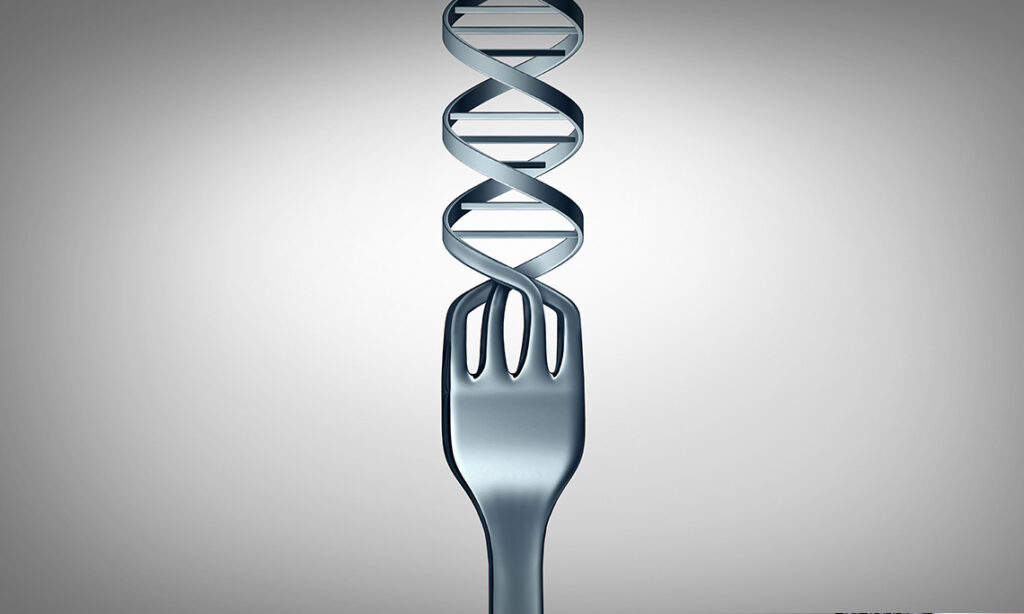Author: Dr. n. biol. Karolina Trzeciak, PhD
Nowadays everyone knows such terms as the gene and DNA. It would seem that if we could decode all the information contained in our DNA, we could find out everything about a particular person. We would be able to know as early as in the foetal period what a person would look like, but also whether he or she would develop diabetes, obesity, cancer, mental illnesses and maybe even when that person would die. However, the matter is not as simple as it seems. If or to what extent a certain trait written in our genotype (the total genetic information we possess) will manifest itself is influenced by a number of environmental factors. This means that, for example, a person who has the genes for a tall height will, under optimal conditions, develop this trait, but if as a child they are exposed to malnutrition, they are highly likely to be shorter than the information contained in their DNA would allow them to be. Furthermore, it is worth to note that every somatic cell of the body contains the same genetic information, but, nevertheless, a skin cell differs significantly from a muscle cell or a blood cell.
This is where epigenetics comes in.
While Genetics is the science that deals with genes and the associated heredity and variability of organisms, epigenetics deals with changes in the expression (manifestation) of genes that are not the result of changes in the sequence of nucleotides in DNA. Epigenetic mechanisms affecting changes in phenotype (phenotype is a set of characteristics of an organism, a set of all the features of an organism’s structure and physiology, but also behaviour, determined by genotype and environment) occur during the development of an organism, from its conception until death, and are strongly linked to differentiation, DNA repair mechanisms and intracellular stress. Some epigenetic changes can be transmitted between generations, i.e. inherited, but only if they occur in germ or reproductive cells. Importantly, changes in the so-called epigenome, can also occur in adulthood and it appears that we have a real influence on them.
One such factor that is under our full control is nutrition.
What our diet is like can affect the expression of certain genes, and this does not only apply to the effect of a pregnant woman’s diet on her child’s development. Abnormal epigenetic mechanisms significantly influenced by diet can result in oxidative stress, obesity, insulin resistance, diabetes and cardiovascular problems, among others. This is due to the activation of genes that under physiological conditions should be silenced or the lack of activation of genes needed by the body. Among the nutrients with a broad spectrum of action in protecting the genome, those most often cited as important for its stability are vitamins A, C, E, D, B3, B12 and folic acid.
Studies show that their deficiencies can be linked to specific diseases and changes in DNA.
Many studies also show that biologically active substances in plants, such as flavonoids, terpenes, etc., affect the cell’s metabolism and signalling pathways. Consequently, they may have an effect on silencing certain signalling pathways, preventing, among other things, the tumour formation. At the same time, providing scientific evidence for the health-promoting effects of food can be difficult, as research results are often ambiguous. However, the reason for this may be a result of differences in the genotype of individual people. By understanding epigenetic mechanisms and individual genetic conditions, it may be possible in the future to customise diets and functional foods for groups with an increased predisposition to certain diseases, allowing them to avoid them. It is increasingly being said that our life and health is not pre-programmed from conception, and our influence on it is crucial. It is above all our habits that determine how we will feel in a few, a dozen or several decades.
If you are looking for information on health and healthy living, go to www.whlf.eu and find us on social media: Facebook, YouTube, Instagram and LinkedIn.
Sources:
- Moosavi A., Motevalizadeh A. (2016)Role of Epigenetics in Biology and Human Diseases. Iran Biomed J. 2016, 20(5), 246–258.
- Choi S. W., Friso S. (2010) Epigenetics: A New Bridge between Nutrition and Health. Adv. Nutr. 2010, 1(1), 8-16.
- Poczęta M., Nowak E., Bieg D., Bednarek I., (2018) Modyfikacje epigenetyczne a ekspresja genów w nowotworzeniu. Ann. Acad. Med. Siles. 2018,72, 80–89.
- Glad C. A., Andersson-Assarsson J. C., Berglund P., Bergthorsdottir R., Ragnarsson O., Johannsson, G. (2017). Reduced DNA methylation and psychopathology following endogenous hypercortisolism–a genome-wide study. Scientific reports, 7(1), 1-11.
- Shin, W., Yan, J., Abratte, C. M., Vermeylen, F., Caudill, M. A. (2010). Choline intake exceeding current dietary recommendations preserves markers of cellular methylation in a genetic subgroup of folate-compromised men. The Journal of nutrition, 140(5), 975-980.
- Bishop, K. S., Ferguson, L. R. (2015). The interaction between epigenetics, nutrition and the development of cancer. Nutrients, 7(2), 922-947.
- Sawicki W., Malejczyk J., Wróblewska M. (2015). Starzenie: mechanizmy epigenetyczne i genetyczne Aging: epigenetic and genetic mechamisms. Gerontologia Polska, 2.
- Berger S. L., Kouzarides T., Shiekhattar R., Shilatifard A. (2009) An operational definition of epigenetics. Genes and development. ;23(7):781–783.
- Haluskova J. (2010) Epigenetic studies in human diseases. Folia biologica (Praha) ;56(3):83–96.
- Egger G., Liang G., Aparicio A., Jones P. A. (2004) Epigenetics in human disease and prospects for epigenetic therapy. Nature. ;429(6990):457–463.
- 14. Lu Q., Qiu X., Hu N., Wen H., Su Y., Richardson B. C. (2006). Epigenetics, disease, and therapeutic interventions. Ageing research reviews. 5(4):449–467.
- Weaver I. C. G., Cervoni N., Champagne F. A., D’Alessio A. C., Sharma S., Seckl J. R., Dymov S., Szyf M., Meaney M J. (2004) Epigenetic programming by maternal behavior. Nature neuroscience. 7(8):847–854.
